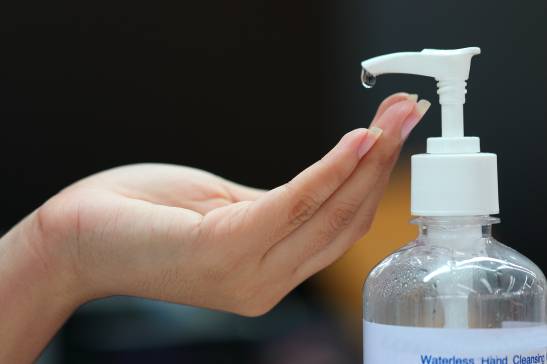Do you use household bleach to clean? It’s a common product found in many households and even on, as bleach is great for killing germs and keeping whites whiter. However, bleach is a substance that can be toxic for dogs (and other fur babies).
Connect with a verified veterinarian in minutes. Licensed vets are available 24/7 to answer your questions. No need to worry about your furry family member.
Bleach Poisoning in Dogs
This is a common problem for pet parents if they use bleach (including color-safe bleach, which uses hydrogen peroxide) around the house. The type of bleach you have at home is more than likely an irritant, rather than a corrosive, like concentrated bleach (used in industrial situations, such as farming, etc.). However, if your fur baby drinks enough household bleach, he could still be poisoned. It all depends on how diluted the bleach is with water. The more water, the lower the toxicity.
It’s best to keep bleach in out of the way places your fur baby can’t reach. However, accidents do happen. Your canine companion may quickly lap up liquid that spills out of a bucket of water and bleach that you’re using to clean the floors, for instance. It can happen in the blink of an eye. Some dogs are that fast.
What Causes Bleach Poisoning in Dogs?
Dogs love to play with almost anything, including household cleaning fluid bottles (such as bleach containers). They love the feel of different textures in their mouths and are horribly curious about everything in their environment. However, this means that a curious dog could potentially become poisoned by toxic substances such as bleach. Ingesting such a chemical can have serious consequences on your dog’s health.
It’s also possible for a dog to inhale bleach fumes and suffer health issues, just as drinking bleach can make him seriously sick. For instance, a dog that inhales bleach may develop any of the following health issues:
- Aspiration pneumonia
- Changes in blood serum
- Kidney damage
- Damage to the digestive tract
- Blood coagulation issues

Review symptoms, medications & behavior to keep your pets healthy with a Vet Online in just minutes.
Ask a Vet Live NowBleach is in Many Cleaners
Not only do you have to worry about plain household bleach, but chlorine bleach is found in many household cleaning products. These are most often laundry and cleaning products, including dishwashing liquid/tabs, laundry detergent, and more.
If you know your fur baby has ingested bleach or a cleaner containing bleach, then your he may only end up with an upset stomach, or he could become very ill. It all depends on how much bleach he ingests and if other chemicals, found in other household cleaners, are involved.
Signs & Symptoms of Bleach Poisoning in Dogs
Your fur baby may show these signs and symptoms after drinking bleach:
- Coughing
- Upset stomach, stomach pain
- Sore throat
- Drooling
- Burn (on skin—usually around his mouth and nose)
- Paw discoloration (if he’s stepped in the bleach)
- Diarrhea
- Weak limbs
- Tremors
- Ulcerations in the mouth/throat and possibly on paws
- Seizures
Important note: If your dog has ingested bleach, do not induce vomiting, unless directed to do so by your vet.
How is Bleach Poisoning Diagnosed in Dogs?
When you reach the vet’s office, they may induce vomiting and collect a sample of the vomit in a plastic container. The vet does this to see if your fur baby has eaten bleach and what kind of product it is.
Next, the vet will check your dog’s mouth for burns in his mouth caused by the bleach. However, the vet may not find burns right away, as these may take up to several hours to become apparent. Your dog’s digestive tract may also have been burned by the bleach. In addition, the vet may run blood work and other tests as required.
Treatment of Bleach Poisoning in Dogs
If you know for sure your dog has only ingested a small amount of household bleach, then you should call the vet immediately. If your dog is only drooling and not vomiting, the vet may advise you to give your fur baby something to drink. It can be water or milk, or even canned meat juice—whatever your dog will accept. The liquid will help to neutralize the bleach your dog has had. In this case, your fur baby should feel better in about 30-45 minutes.
However, if your fur baby is exhibiting serious signs of poisoning, then you’ll need to take him to the vet for immediate treatment. Your fur baby may need his stomach pumped, or the vet may try activated charcoal to bind the toxins and keep them from being absorbed in the intestines. The vet may also give your dog intravenous fluids to keep him hydrated and to flush the toxins from his system.
The need for additional treatment will depend on the severity of your dog’s symptoms. Your fur baby may even require hospitalization for a few days until he’s feeling better.
In most cases, dogs will fully recover from bleach poisoning. Once your dog comes home, it’s imperative to follow your vet’s directions for your dog’s further recovery. It’s also a good idea to make sure all bleach and other household chemicals are out of your dog’s reach altogether.
Connect with a verified veterinarian in minutes. Licensed vets are available 24/7 to answer your questions. No need to worry about your furry family member.

Kim
Kim is a talented author, who loves animals especially dogs. She engaged in writing books and articles relating to animals a decade ago. Kim resides in Chicago with her husband and son. The family is the proud owner of a dog and a parrot (Jack and Lily). Kim wanted more than these two pets, but her husband put his foot down... She often visits elementary schools to talk to the kids about what she learned about pets and how they could learn from them.
Review symptoms, medications & behavior to keep your pets healthy with a Vet Online in just minutes.
Ask a Vet Live Now



